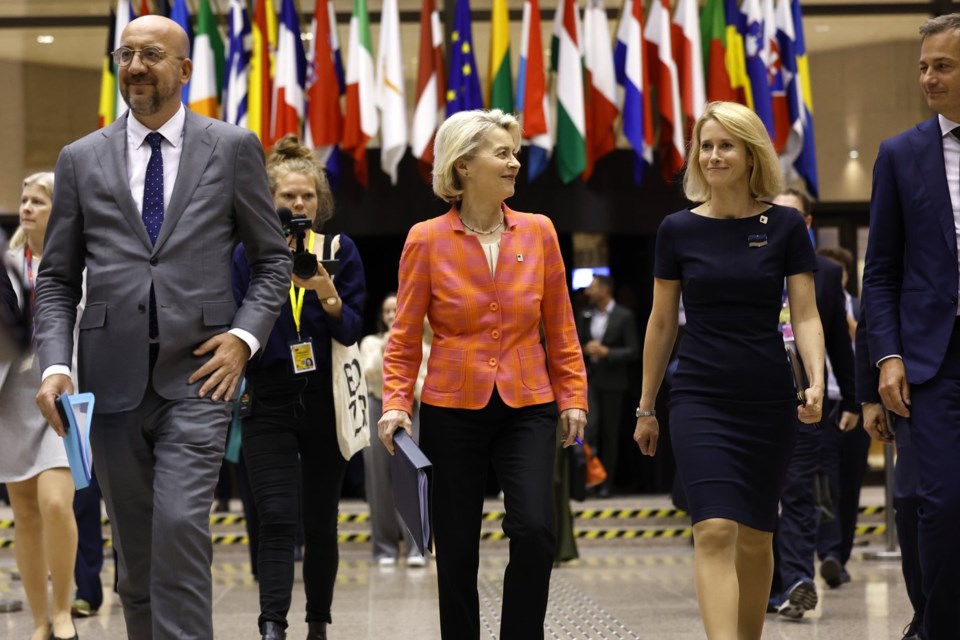BRUSSELS (AP) — European Union leaders signed off on a trio of top appointments for their shared political institutions on Thursday, reinstalling German conservative Ursula von der Leyen as president of the European Commission for another five years.
At the side of von der Leyen, who heads the EU’s executive branch, would be two new faces: Antonio Costa of Portugal as European Council president and Estonia’s Kaja Kallas as the top diplomat of the world’s largest trading bloc.
“Mission Accomplished,” outgoing EU Council President Charles Michel told reporters after chairing a summit of the bloc's leaders, as von der Leyen and Kallas accompanied him at a joint a news conference. Costa took part via video-link.
Von der Leyen expressed her gratitude for a shot at a second term of office, saying: “I’m very honored and I’m delighted to share this moment.”
Kallas, who as the EU’s top diplomat will lead the bloc’s foreign and security policy with Russia's war on Ukraine in its third year, noted that “there is war in Europe, also growing instability globally. My aim is definitely to work for the European unity.”
Both von der Leyen and Kallas should now be approved by European lawmakers. Costa’s nomination only needed the leaders’ approval, and he will start in his new role in fall.
After the three centrist political families in the European Parliament struck a deal earlier this week, the top jobs package was widely expected to be approved without controversy at the summit in Brussels.
But far-right politicians, emboldened by their strong showing in EU parliament elections earlier this month, slammed it as a stitch-up.
Italian Prime M inister Giorgia Meloni made clear her displeasure at being excluded from preparatory talks with a small group of leaders who divvied up the top jobs. Her nationalist European Conservatives and Reformists group emerged as the third force in the EU parliament elections earlier this month.
Meloni voted against Portugal’s Costa and Estonia’s Kallas, two sources close to the discussions told The Associated Press on condition of anonymity. Meloni abstained on von der Leyen for European Commission president, the same sources confirmed. The officials requested anonymity in line with EU practice.
In a post on X, Meloni said the way that mainstream parties put forward the trio “is wrong in method and substance. I decided not to support it out of respect for the citizens and the indications that came from those citizens during the elections.”
In the end only one leader, nationalist Hungarian Prime Minister Viktor Orbán, rejected the three outright.
“European voters were cheated,” he said on Facebook Thursday evening. “We do not support this shameful agreement!” His objections were moot: the package only needed a two-thirds majority to pass.
The June 6-9 election saw the EU’s legislature shift to the right and dealt major blows to mainstream governing parties in France and Germany, but the three mainstream groups managed to hold a narrow majority of seats.
Costa, a former Portuguese prime minister, hails from the center-left Socialists and Democrats group, which came second. Kallas is prime minister of her tiny Baltic home country. She comes from the pro-business liberal group, which is also home to embattled French President Emmanuel Macron and lost seats in the June poll, trailing into fourth place.
EU top appointments are supposed to ensure geographic and ideological balance, but ultimately it is the 27 leaders who call the shots - and generally the most powerful among them.
While Costa’s appointment is decided by EU leaders alone, both von der Leyen and Kallas will also need to be approved by a majority of lawmakers. With 720 members, the threshold is 361. That vote could happen when the newly constituted European Parliament meets for the first time in July.
The European Council is the body composed of the leaders of the 27 member states. If confirmed, Costa’s role as president would be to broker deals within an often hopelessly divided political club. In Portugal, he is known as a savvy negotiator.
As foreign affairs chief Kallas, whose country neighbors Russia and has taken a strong line on Moscow in its war with Ukraine, would represent the bloc on the world stage.
But von der Leyen’s role is the most powerful. As commission president, her job is to devise and implement the bloc’s shared policy on everything from migration to the economy and environmental rules.
With the far right pushing back against the flagship EU policies ushered through in the last five years, von der Leyen’s critics charge she is poised to roll back ambition.
Ella Joyner, Samuel Petrequin And Lorne Cook, The Associated Press

